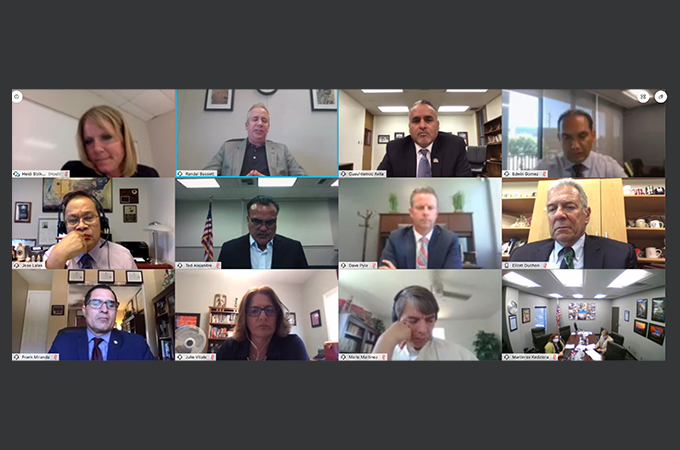On July 14, educators and administrators from across Southern California school districts gathered virtually for the 16th annual University of Redlands School of Education Summer Institute for Leadership in Educational Justice. The event, hosted by the Center for Educational Justice, addressed educational equity, leadership, and the future of schooling in the midst of the COVID-19 pandemic.
Formed in 2006, the Center for Educational Justice builds awareness around issues in education and facilitates discussions about how those issues can be resolved.
“Education is continuum—it’s all connected, and we need to advance toward a world where we understand how one part affects the others,” said Mario Martinez, the new U of R School of Education’s Robert A. & Mildred Peronia Naslund Endowed Dean. “We all bring our own unique strengths, and the way that we partner together will define our spirited inquiry, how we learn together, and how we address problems.”
Advocating for equity
Robin Avelar La Salle delivered the event’s keynote address. A former teacher and administrator, La Salle is now the founder and chief executive officer of Orenda Education, a technical assistance organization that serves schools and other educational institutions. Her research revolves around the educational achievements of historically underserved students and using data to close the achievement gap.
In her talk, which was based on her book Shattering Inequities: Real-World Wisdom for School and District Leaders (Rowman & Littlefield Publishers), La Salle stated that educators need to address inequities that exist within their classrooms and institutions.
“Our moral imperative as educators is to go to work and look for trouble in order to determine where the inequities exist,” said La Salle. “Since schools closed in March, it is estimated that we have lost between two and 16 years of equity between students. It’s our responsibility to identify the places where students aren’t receiving their due.”
In order to become an “equity warrior”—an advocate for justice in the educational system—La Salle offered practical applications to prioritize equity. She encouraged the audience to challenge the normalization of failure by questioning assumptions and creating a standard for instruction within schools.
In closing, she reminded attendees that it doesn’t take much to be able to identify educational inequities—educators just need to have the heart, will, and know-how to seek out and address them. “Every system is perfectly designed to get the results it is getting,” she said. “Enough is enough. We are responsible for what we have control over, and we control so much.”
Unprecedented challenges
Throughout the day, 858 attendees participated in a variety of panels that touched on the history of activism in education, equitable virtual learning, leadership perspectives in addressing equity, and professional empowerment for teachers and administrators. The event ended with a superintendent’s forum that addressed reopening schools and student learning during a pandemic.
Oceanside Unified School District Superintendent Julie Vitale stressed the importance of using diverse and inclusive teaching materials, regardless of teaching modality, in her opening remarks for the panel. “It is incumbent upon us as educators to ensure that the curricula we employ are inclusive so that all students can see themselves represented in the classroom,” she said.
The majority of the 10 panelists worked in school districts in the Inland Empire and spoke about their plans for the upcoming school year, focusing on maintaining the ability to adapt to different teaching modalities—virtual, hybrid, or in-person—as guidelines and regulations change. Most of the participants have worked in education for decades, but many of them noted that operating schools during the COVID-19 pandemic has brought a series of unprecedented challenges.
Deputy Superintendent of Riverside Schools Edwin Gomez spoke of the confusion that he and his colleagues are experiencing, as schools are expected to open to in-person instruction while the state capitol and other essential businesses are shutting down again.
Fontana Unified School District Superintendent Randal Bassett touched on his concerns about student safety, especially for those who may be homeless or immunocompromised, and remarked that these circumstances are exacerbating the achievement gap and learning loss.
“The one thing that keeps me awake at night is the fact that we can’t see the students we’re serving,” said Jurupa Unified School District Superintendent Elliott Duchon. “I ask myself: What’s happening to the students at home we can’t reach?”
Closing the panel, Director of the Center for Educational Justice Jose Lalas delivered a charge to the superintendents and attendees, encouraging them to lead with generosity and courage in order to equitably meet the needs of their communities during the pandemic.
While concern for students’ wellbeing defined the conversation, the panelists also reflected a commitment to engaging and addressing the concerns of teachers, administration, staff, and parents as schools move forward.
Learn more about the School of Education.






